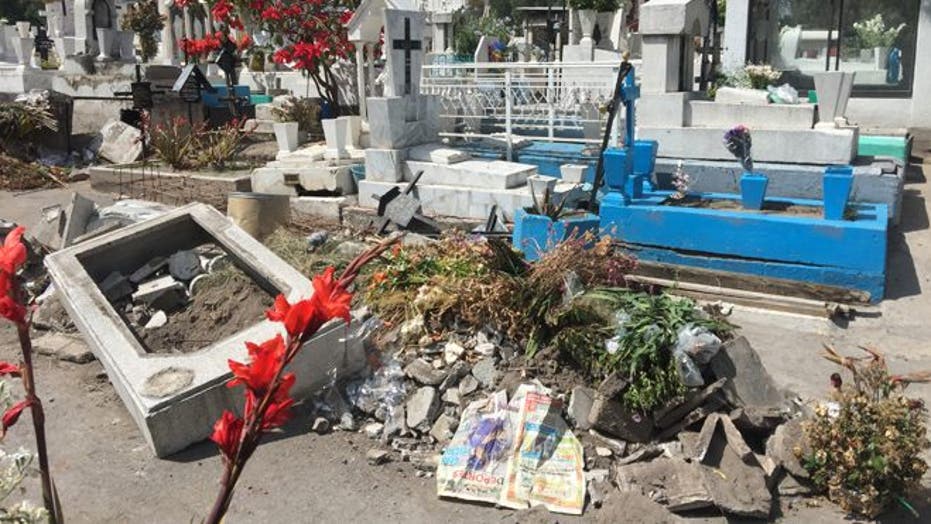Mexico City – Alarmed by the possibility of violent crime, this year Mexico City residents are shying away from the capital’s cemeteries for traditional Day of the Dead rituals. They’d rather honor their ancestors from the safety of their own homes.
Following a pre-Hispanic custom of bringing food, drink and offerings to the gravesites of deceased relatives, the Day of the Dead celebrations see thousands of visits to cemeteries across the country from Oct. 29 to Nov. 2.
But following a spate of break-ins and robberies at the Iztapalapa graveyard in Mexico City, one of the capital’s most dangerous districts, many members of ground staff say they have seen a significant drop in visitors to family gravestones.
“The graveyard has become notorious as an easy place to commit a crime and get away with it,” graveyard supervisor Benjamin Mendoza told Fox News Latino. “Residents feel off their guard while kneeling at their loved ones’ gravesides.”
On the night of Oct. 19, criminals broke the chains on the front gate of Iztapalapa Municipal graveyard, where over 5,000 people are buried, before raiding the storeroom, front office and a number of graves belonging to the wealthiest families in town.
It was the fourth break-in during the last three months.
“The night watchman was asleep through every incident,” according to Mendoza, who says he gave up investigating the crime spree following the first break-in.
Robbery has also been known to occur at gravesides during the five-day celebration of the Day of the Dead, when praying families are an easy target for thieves.
Ninety-year-old Raúl Mendez was robbed at gunpoint two years ago as he paid his respects at his parents’ graveside. He says the experience shocked him but has not stopped him from returning.
“Two hooded men put a gun in my face and told me to give them everything I had, down to my jacket,” he told Fox News Latino with tears in his eyes. “I could not believe people could stoop so low as to rob an old man in a graveyard.”
“But to stop coming would be to let those sons of b***s scare me off a beautiful Mexican tradition,” he said. “Since the incident, I have not brought any valuables with me to the graveside.”
The Iztapalapa graveyard received just 12,000 visitors during the 2015 Day of the Dead celebration, down from an estimated 31,000 who visited their ancestors at the same cemetery a decade ago.
“I can understand why people wouldn’t want to visit once they’ve been through something like that,” Mendez said, “but if you’re going to be shot, where better than a graveyard?”
The Iztapalapa graveyard is an ideal site for would-be robbers. The tightly packed gravesites and single-story shrines, combined with the crowds that visit the area during the ceremonial days, allow criminals to vanish within seconds of a robbery.
It’s not only the rough districts of Mexico City that have suffered from this crime wave. A spree of grave robberies have occurred throughout the capital, particularly in the more affluent western districts since 2014, leaving police and residents at a loss of how to handle graveyard security.
Rosa María Alorón and her mother, Graciela Cruz, say they prefer to hold their gravesite visits weeks ahead of the festival days to avoid the risk of robbery.
“We come to their graves beforehand to pray a rosary while we can feel safe,” she said. “Many of my friends have been robbed here, so it’s better to come earlier.”
“We hold our actual ceremony at home, where we put out a candle for each relative as well as offerings of the things they enjoyed,” Alorón told FNL while putting out fresh flowers at her father’s grave.
The Iztapalapa government has reacted to the robberies by sending police officers to patrol the graveyard during the higher-density periods of the festivities, but many say it is a difficult area to police.
“We’re stepping up security again for this year, but it’s a difficult place to police” says Mendoza, who has been the graveyard supervisor for the past six months.
“The robbers here know the cops stick to the paths,” the 90-year-old Mendez said, “and so they concentrate on people in the trickier areas to reach, where you have to dodge around other graves.”
He added, “They will wait until the cops are out of sight, but even then there are multiple entrances, and a 20-year-old robber is always going to get away from a policeman in a maze like this.”
“The only thing the graveyard cops actually do during the Day of the Dead is stop you from enjoying a beer or tequila beside your dead relatives,” he said.





















